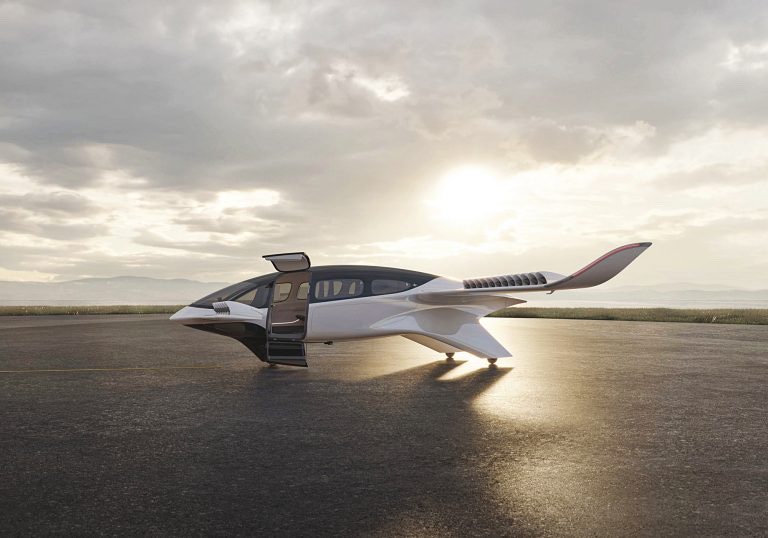
Denso: Providing motors for Lilium Jet!
ー Surprised at “4kg/100kW”! –
Denso
Honeywell International
May 2022,
“Jointly developed electric motor for electric aircraft” has been adopted by Lilium.
Adopted by Lilium:
It will be installed in the eVTOL “Lilium Jet” being developed by German company Lilium.
US Joby Aviation “S4”:
U.S.-based Joby Aviation in which Toyota invests
“S4” is the “favourite” of eVTOL for air taxis based on its spec values and flight performance.
eVTOL “Lilium Jet”:
Thrust deflection type eVTOL “Lilium Jet”
It has a high specification value with a 7-seater and a cruising range of 250km or more.
30 motors are installed per machine.
It aims to obtain type certification in 2025.
Joby Aviation “S4”:
The “S4” is a 5-seater with a cruising range of 240km.
Features of Lilium Jet:
Ducted Electric Vectored Thrust (DEVT)
Developed its own propulsion system.
Flap part:
30 duct fans (a structure in which the propeller is placed inside the duct) are installed.
Take off:
Lower the flaps to ascend vertically, then raise the flaps for horizontal flight (Figure 2).
Duct fan method:
Ordinary propellers generate airflow not only in the direction of propulsion but also in orthogonal directions.
Duct fan system improves flight efficiency.
Of course, the noise is also reduced.
Ducted fan motor:
Developed ducted fan:
The motor that drives it was jointly developed by Denso and Honeywell.
One motor for each ducted fan.
30 will be installed in one Lilium Jet (Fig. 3)
The cooling mechanism can be simplified by supporting air cooling.
Structure of the development motor:
It weighs about 4kg and outputs 100kW.
It consists of a stator mechanism and a rotor mechanism.
Nikkei Cross Tech (xTECH)
https://xtech.nikkei.com/atcl/nxt/column/18/02128/00007/
Denso : Fourniture de moteurs pour Lilium Jet !
ー Surpris à “4kg/100kW” ! –
Denso
Honeywell International
Mai 2022,
“Moteur électrique développé conjointement pour avion électrique” a été adopté par Lilium.
Adopté par Lilium :
Il sera installé dans l’eVTOL “Lilium Jet” développé par la société allemande Lilium.
US Joby Aviation “S4”:
Joby Aviation, basée aux États-Unis, dans laquelle Toyota investit
“S4” est le “favori” de l’eVTOL pour les taxis aériens en fonction de ses valeurs de spécification et de ses performances de vol.
eVTOL “Lilium Jet”:
Déviation de poussée type eVTOL “Lilium Jet”
Il a une valeur de spécification élevée avec un 7 places et une autonomie de 250 km ou plus.
30 moteurs sont installés par machine.
Il vise à obtenir la certification de type en 2025.
Joby Aviation “S4”:
Le “S4” est un 5 places avec une autonomie de 240km.
Caractéristiques de Lilium Jet :
Poussée vectorielle électrique canalisée (DEVT)
A développé son propre système de propulsion.
Partie rabat :
30 ventilateurs de conduit (une structure dans laquelle l’hélice est placée à l’intérieur du conduit) sont installés.
Décoller:
Abaissez les volets pour monter verticalement, puis relevez les volets pour un vol horizontal (Figure 2).
Méthode du ventilateur de conduit :
Les hélices ordinaires génèrent un flux d’air non seulement dans le sens de la propulsion mais également dans des directions orthogonales.
Le système de ventilateur de conduit améliore l’efficacité du vol.
Bien sûr, le bruit est également réduit.
Moteur de ventilateur canalisé :
Ventilateur canalisé développé :
Le moteur qui l’entraîne a été développé conjointement par Denso et Honeywell.
Un moteur pour chaque ventilateur canalisé.
30 seront installés dans un Lilium Jet (Fig. 3)
Le mécanisme de refroidissement peut être simplifié en prenant en charge le refroidissement par air.
Structure du moteur de développement :
Il pèse environ 4 kg et produit 100 kW.
Il se compose d’un mécanisme de stator et d’un mécanisme de rotor.
Nikkei CrossTech (xTECH)
Denso: Bereitstellung von Motoren für Lilium Jet!
ー Überrascht bei “4kg/100kW”! –
Denso
Honeywell International
Mai 2022,
„Gemeinsam entwickelter Elektromotor für Elektroflugzeuge“ wurde von Lilium übernommen.
Von Lilium adoptiert:
Es wird in das eVTOL „Lilium Jet“ eingebaut, das von der deutschen Firma Lilium entwickelt wird.
US Joby Aviation “S4”:
Das in den USA ansässige Unternehmen Joby Aviation, in das Toyota investiert
„S4“ ist aufgrund seiner Spezifikationswerte und Flugleistung der „Favorit“ von eVTOL für Flugtaxis.
eVTOL “Lilium Jet”:
Schubumlenkung Typ eVTOL „Lilium Jet“
Es hat einen hohen Spezifikationswert mit einem 7-Sitzer und einer Reichweite von 250 km oder mehr.
Pro Maschine sind 30 Motoren verbaut.
Ziel ist es, die Musterzulassung im Jahr 2025 zu erhalten.
Joby Aviation “S4”:
Die „S4“ ist ein 5-Sitzer mit einer Reichweite von 240 km.
Eigenschaften von Lilium Jet:
Geführter elektrischer Vektorschub (DEVT)
Eigenes Antriebssystem entwickelt.
Klappenteil:
30 Kanalventilatoren (eine Struktur, bei der der Propeller innerhalb des Kanals platziert ist) sind installiert.
Abheben:
Senken Sie die Klappen ab, um vertikal aufzusteigen, und heben Sie die Klappen dann für den Horizontalflug an (Abbildung 2).
Kanallüftermethode:
Gewöhnliche Propeller erzeugen einen Luftstrom nicht nur in Antriebsrichtung, sondern auch in orthogonalen Richtungen.
Kanallüftersystem verbessert die Flugeffizienz.
Natürlich wird auch das Rauschen reduziert.
Impellermotor:
Entwickelter Impeller:
Der Motor, der ihn antreibt, wurde gemeinsam von Denso und Honeywell entwickelt.
Ein Motor für jeden Impeller.
30 werden in einem Lilium Jet verbaut (Abb. 3)
Der Kühlmechanismus kann durch unterstützende Luftkühlung vereinfacht werden.
Aufbau des Entwicklungsmotors:
Es wiegt etwa 4 kg und leistet 100 kW.
Es besteht aus einem Statormechanismus und einem Rotormechanismus.
Nikkei Cross Tech (xTECH)
DENSO,
Honeywell
Co-Develop E-Motor for Lilium’s All-Electric Jet The e-motor for the Lilium Jet consists of a rotor and stator, weighing approximately 4 kg and having an output of 100 kW.
The rotor and stator
are uniquely designed to meet the small size and low weight necessary to achieve Lilium’s performance goals.
This proprietary,
high-performance system,
on which the Lilium, Honeywell and DENSO teams have already been working for nearly two years,brings exceptional performance and reliability with zero operating emissions typically associated with commercial jet engines.